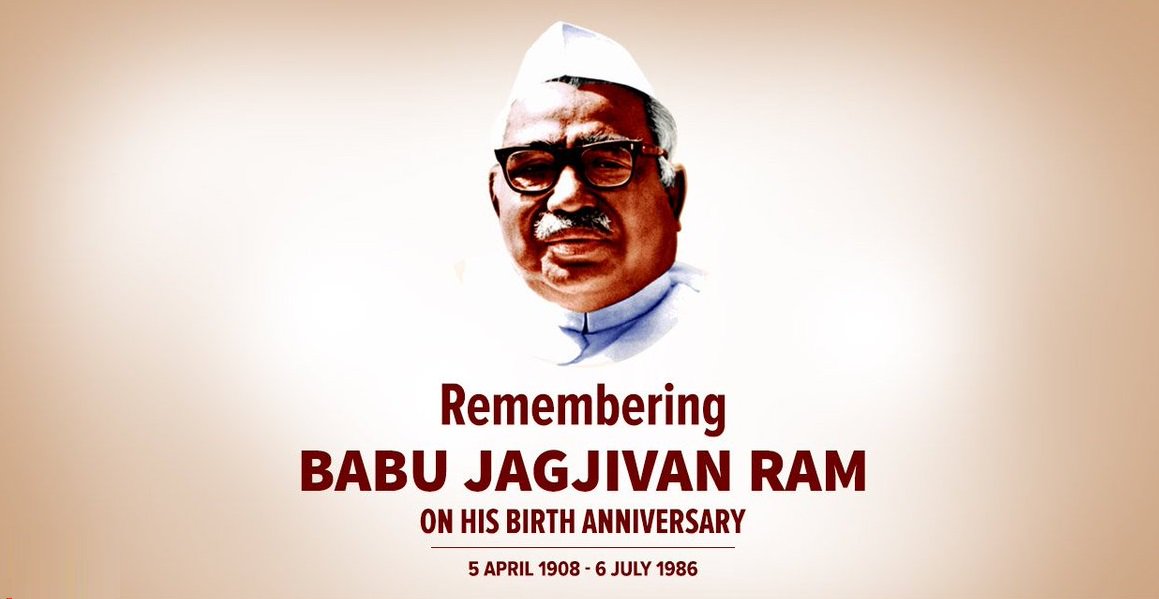
- This event has passed.
Babu Jagjivan Ram’s Birthday
April 5

Babu Jagjivan Ram’s Birthday is celebrated on April 5th each year. He was a prominent Indian political leader, social reformer, and a champion of the Dalit community. Babu Jagjivan Ram is widely regarded for his immense contributions to the upliftment of the marginalized sections of society, especially the Scheduled Castes (formerly known as “untouchables”), and his role in shaping India’s political and social landscape post-independence.
Early Life and Background:
Born: April 5, 1908, in Chandwa, Bihar, British India.
Family: He was born into a poor Dalit family. His father, Shri Hanuman Prasad, was a well-respected school teacher who was deeply concerned with the education of his children, especially Jagjivan Ram.
Despite the challenges of being born into a marginalized community, Babu Jagjivan Ram’s early exposure to education and his supportive family played a significant role in his later rise as a leader.
Key Contributions and Achievements:
Social Reforms and Advocacy for Dalits:
Babu Jagjivan Ram was one of the earliest leaders to fight for the rights and upliftment of the Dalit community. He strongly opposed the social discrimination and untouchability prevalent in India at the time.
He was a lifelong advocate for reservations for Dalits in education, jobs, and politics. This was part of his vision for ensuring social justice and equality for all, irrespective of caste or social status.
Role in the Indian National Congress:
Jagjivan Ram joined the Indian National Congress (INC) in 1934 and quickly became an influential leader, known for his speeches and commitment to the Indian freedom struggle.
He was closely associated with the Bihar Provincial Congress Committee and participated actively in the Quit India Movement in 1942, during which he was arrested by the British authorities.
Post-Independence Career:
After India gained independence in 1947, Babu Jagjivan Ram held several important positions in the Indian government. He served in various ministries, including Agriculture, Defense, Transport, and Labour.
As the Minister of Defence (1970–1974), he played a pivotal role in shaping India’s defense policies and during the India-Pakistan war of 1971, which led to the creation of Bangladesh.
Founding the All India Depressed Classes League:
In 1935, Babu Jagjivan Ram founded the All India Depressed Classes League to fight for the rights of the Dalits and address issues like untouchability, exploitation, and discrimination.
Support for Land Reforms and Economic Equality:
He strongly advocated for land reforms and economic policies aimed at addressing the poverty and exploitation of the rural poor, particularly the Dalits.
Champion of Education for Dalits:
Babu Jagjivan Ram was a firm believer in the power of education as a tool for social change. He worked towards making education accessible to Dalit children and emphasized the importance of quality education in breaking the shackles of caste-based discrimination.
Supporter of the Reservation System:
One of his most significant contributions was his unwavering support for the reservation system in education and government jobs. He believed that reservation would be an effective tool for promoting social equality and helping Dalits attain opportunities previously denied to them.
Legacy of Babu Jagjivan Ram:
Babu Jagjivan Ram’s legacy continues to inspire generations of people, particularly in the context of social justice and empowerment of marginalized communities in India. Some of his major contributions include:
A Fighter for Dalit Rights: His efforts to bring social justice to the Dalit community are a significant part of his legacy. He challenged the social order that discriminated against Dalits and worked for their upliftment.
Champion of Reservation: His support for affirmative action for Dalits and other marginalized communities paved the way for more inclusive policies in education, employment, and politics.
Role in National Politics: As a senior leader of the Congress Party and as a minister, he helped shape the post-independence Indian state, contributing to important policies in areas such as defense, agriculture, and labor welfare.
A Symbol of Integrity and Leadership: Babu Jagjivan Ram was respected not only for his social work but also for his personal integrity, dedication to public service, and his unwavering commitment to the nation’s progress.
Commemoration of His Birthday:
Babu Jagjivan Ram’s birthday, April 5, is observed as a day of reflection and celebration of his contributions to Indian society. Various events, discussions, and programs are organized, especially in regions with large Dalit populations, to honor his memory and reflect on his role in shaping India’s future. These include:
Seminars and talks on his contributions to Dalit rights, social justice, and his political legacy.
Cultural events and welfare programs in his honor, particularly focusing on issues related to education, poverty alleviation, and social equality.
Political tributes by leaders who continue to draw inspiration from his life and work.
Conclusion:
Babu Jagjivan Ram was a towering figure in Indian politics and a dedicated social reformer who spent his life fighting for the rights of Dalits and marginalized communities. His contributions to social justice, empowerment, and education continue to influence Indian society today, and his legacy is celebrated on his birthday, April 5th, as a reminder of the ongoing fight for equality and inclusion in India.
